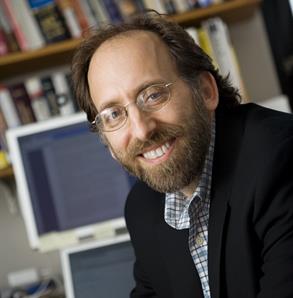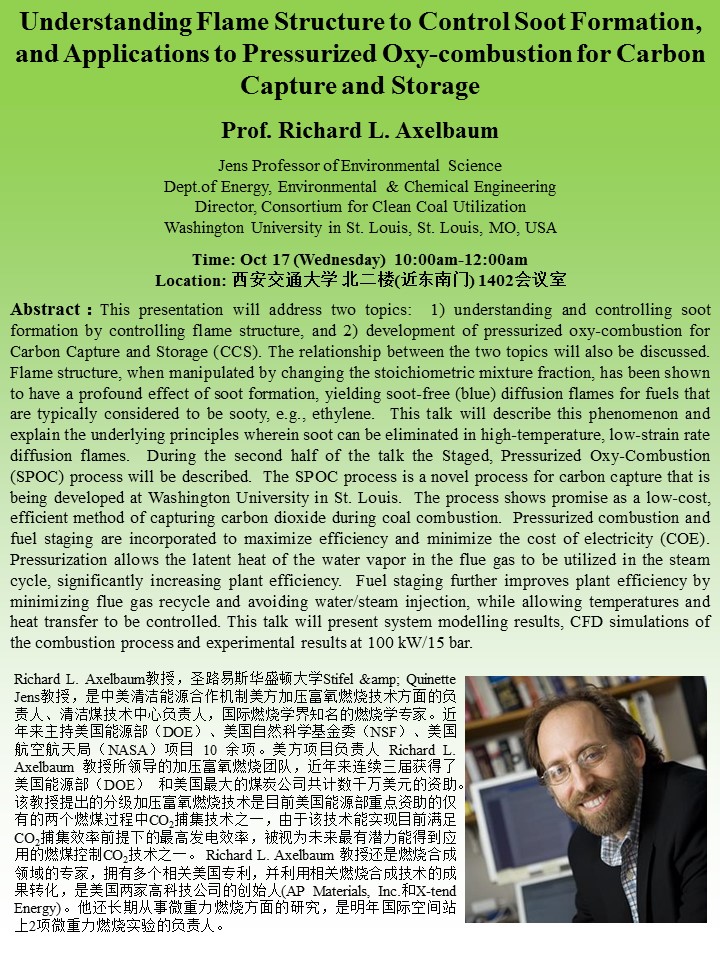Understanding Flame Structure to Control Soot Formation, and Applications to Pressurized Oxy-combustion for Carbon Capture and Storage
Richard L. Axelbaum
Jens Professor of Environmental Science
Dept.of Energy, Environmental & Chemical Engineering
Director, Consortium for Clean Coal Utilization
Washington University in St. Louis, St. Louis, MO, USA

Abstract
This presentation will address two topics: 1) understanding and controlling soot formation by controlling flame structure, and 2) development of pressurized oxy-combustion for Carbon Capture and Storage (CCS). The relationship between the two topics will also be discussed. Flame structure, when manipulated by changing the stoichiometric mixture fraction, has been shown to have a profound effect of soot formation, yielding soot-free (blue) diffusion flames for fuels that are typically considered to be sooty, e.g., ethylene. This talk will describe this phenomenon and explain the underlying principles wherein soot can be eliminated in high-temperature, low-strain rate diffusion flames. During the second half of the talk the Staged, Pressurized Oxy-Combustion (SPOC) process will be described. The SPOC process is a novel process for carbon capture that is being developed at Washington University in St. Louis. The process shows promise as a low-cost, efficient method of capturing carbon dioxide during coal combustion. Pressurized combustion and fuel staging are incorporated to maximize efficiency and minimize the cost of electricity (COE). Pressurization allows the latent heat of the water vapor in the flue gas to be utilized in the steam cycle, significantly increasing plant efficiency. Fuel staging further improves plant efficiency by minimizing flue gas recycle and avoiding water/steam injection, while allowing temperatures and heat transfer to be controlled. This talk will present system modelling results, CFD simulations of the combustion process and experimental results at 100 kW/15 bar.
Biography
Richard Axelbaum is the Jens Professor of Environmental Science in the Department of Energy, Environmental and Chemical Engineering at Washington University in St. Louis. He is currently the Director of the Consortium for Clean Coal Utilization at Washington University and from 1998 to 2007, he was chairman and chief scientific advisor for AP Materials, Inc., a startup company he founded that specialized in flame synthesis of nanopowders. The company was acquired by Cabot Corporation in August of 2007.
Dr. Axelbaum studies combustion phenomena, ranging from oxy-coal combustion of coal to synthesis of nano-structured materials for electric vehicles. His studies of fossil fuel combustion focus on understanding the formation of pollutants, and then using this understanding to develop novel approaches to eliminating them.
Professor Axelbaum has performed research combustion in microgravity, and is principal investigator and co-investigator for two combustion experiment that will be conducted on the International Space Station this coming year.
Professor Axelbaum has over 110 peer-reviewed publications and holds seven patents.
